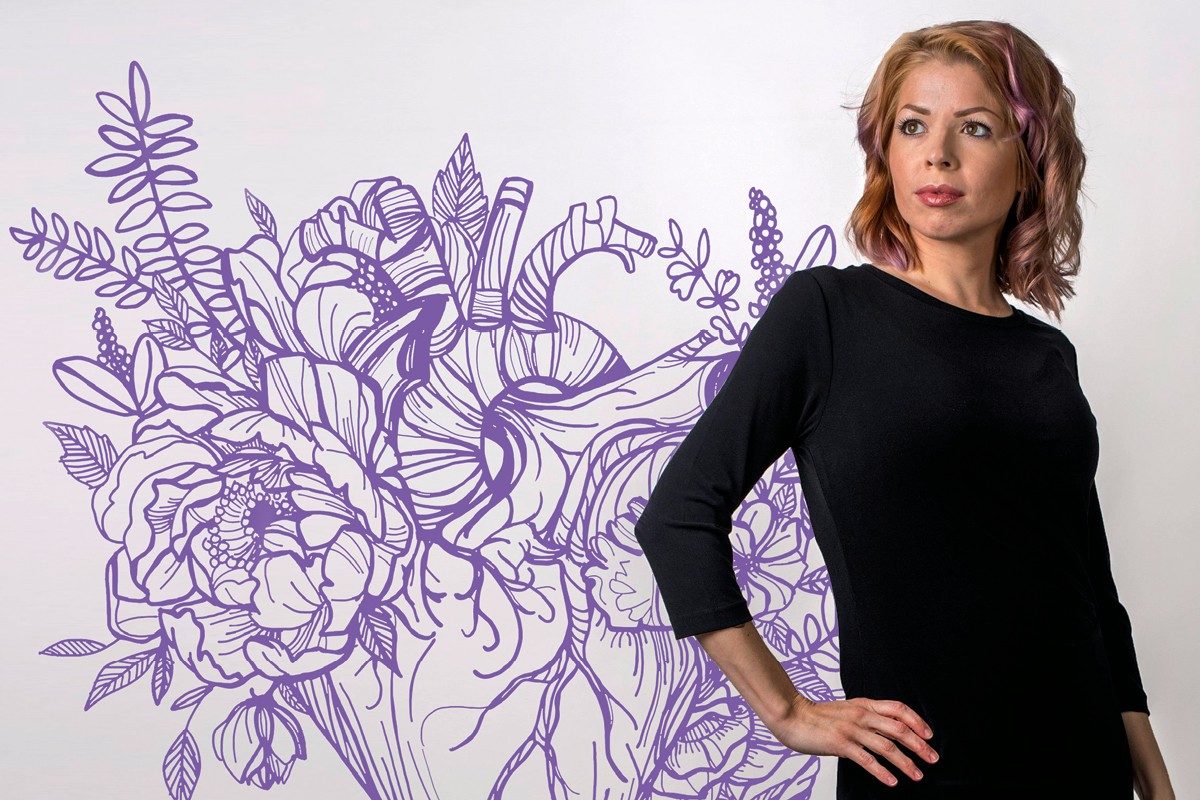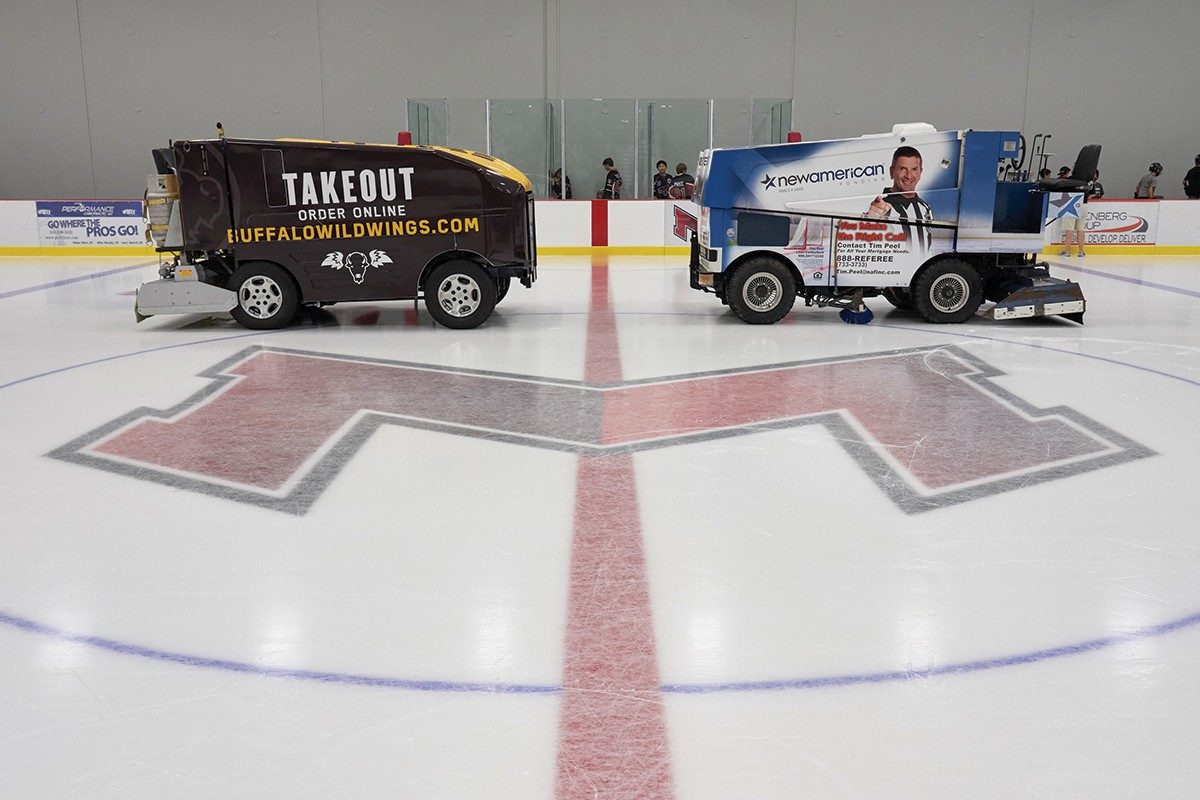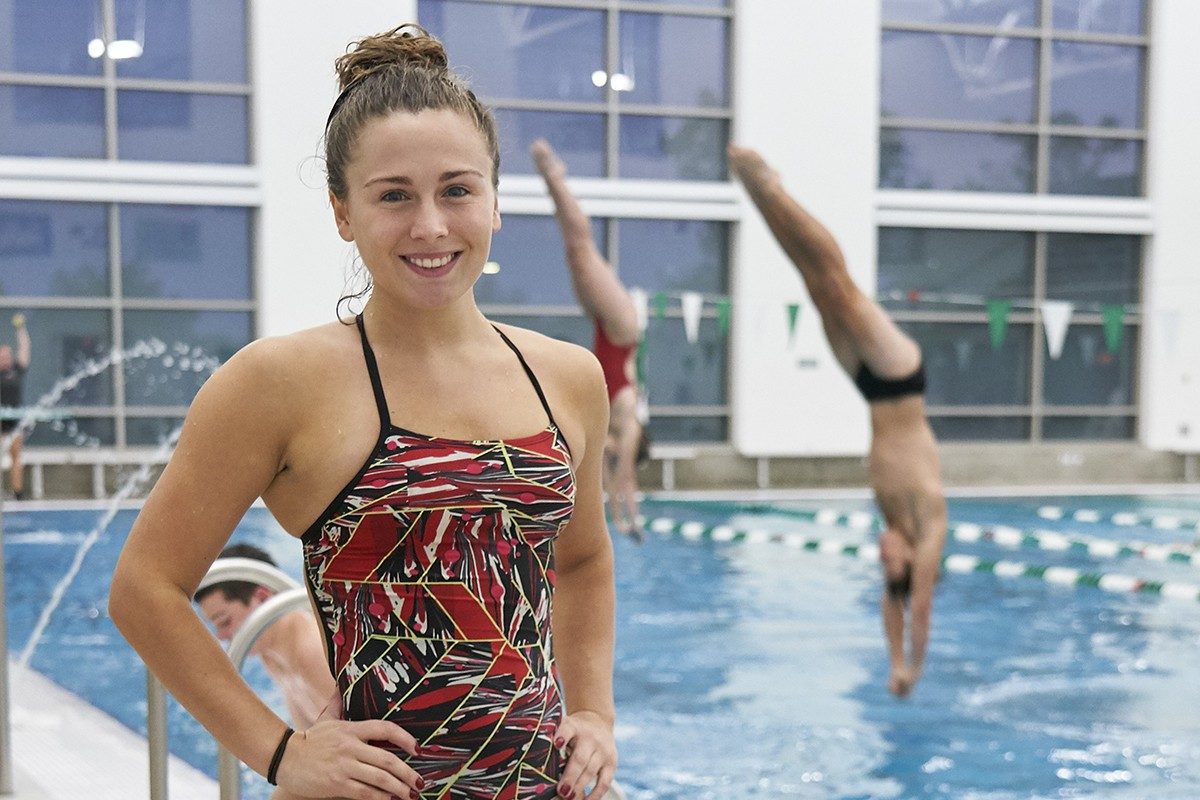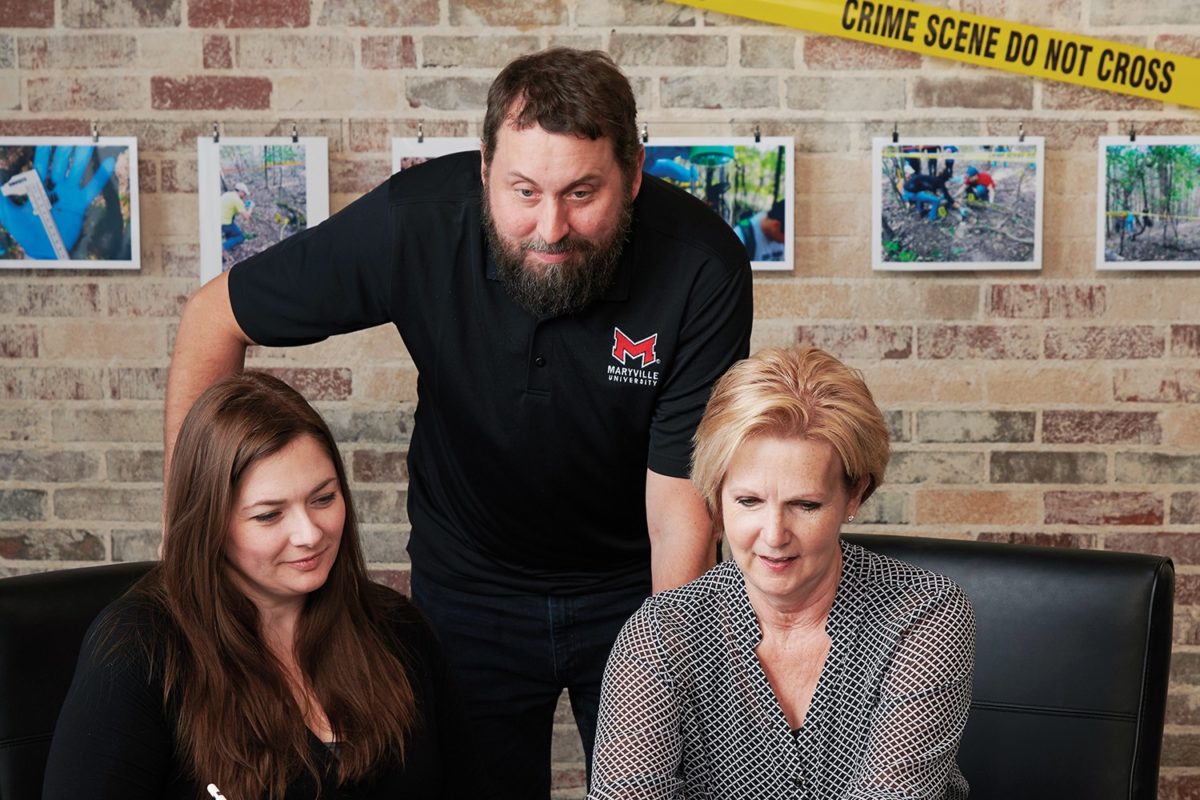When people think about college internships, they likely picture students taking notes, making copies and fetching coffee. However, when the internship opportunity is working with endangered animals, especially cute wolf pups, that picture looks quite different.
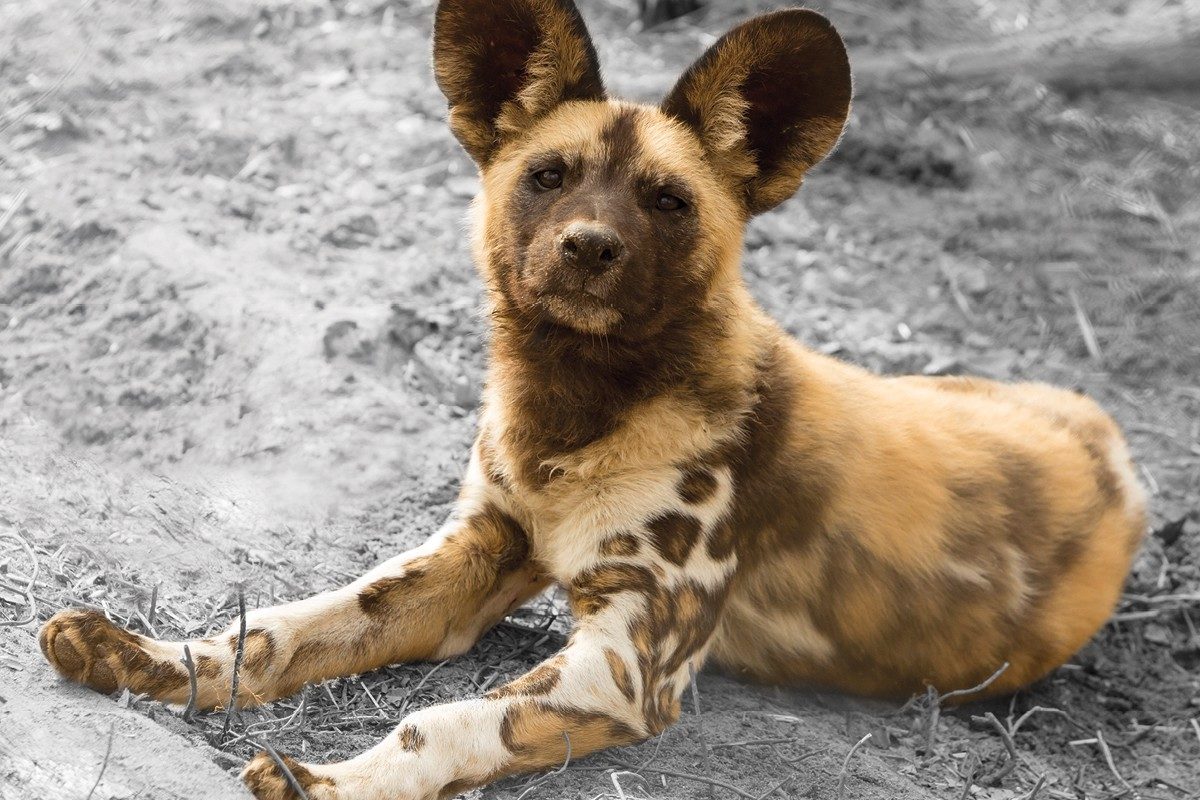
Not Your Grandma’s Big Bad Wolf
BY LAURA DERICKSON ’93
During the most recent spring semester, biology majors Deanna Deterding and Patrick Glass interned at the Endangered Wolf Center (EWC), a nonprofit conservation facility in Eureka, Missouri, dedicated to preserving critically endangered species of wolves and reintroducing them to the wild. Their academic advisor Kyra Krakos, PhD, associate professor of biology, encouraged them to apply.
The timing of these internships was particularly exciting because of the recent addition of two litters of African painted dog pups, an endangered canid native to sub-Saharan Africa. The two litters — 23 puppies total — allowed the center to implement research projects comparing the two litters.
In addition to monitoring trail cameras and sorting through thousands of photos, Glass spent much of his time observing the wolf pups and collecting data for two hours at a time, recording their behavior at 10-minute intervals.
“During the observations, I created a written snapshot of what the wolves were doing,” Glass said. “I noted if they were eating, chasing each other, chewing on sticks and other movements. I also noted if the adults were lying together or interacting with the pups, or if one of the pups was alone. It was a lot of fun, because it was watching puppies, and they’re really cute.”
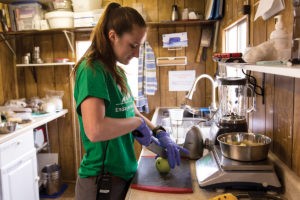 The most challenging part of the observations for Glass was dealing with the winter cold. Although he was partially protected by a blind (a cover device designed to reduce the chance of detection), Glass said, “I always thought I didn’t mind winter, but after sitting out there for two hours at a time and regularly wiggling my cold toes to warm them, I realized I definitely like summer better.”
The most challenging part of the observations for Glass was dealing with the winter cold. Although he was partially protected by a blind (a cover device designed to reduce the chance of detection), Glass said, “I always thought I didn’t mind winter, but after sitting out there for two hours at a time and regularly wiggling my cold toes to warm them, I realized I definitely like summer better.”
After each observation, another intern compiled the data to look for patterns of behavioral change over a period of time. According to the EWC’s General Curator, Erin Connett, the data being collected such as nutrition, feeding habits, body measurements, activity levels and the interactions of the moms with their pups, will be used in vital research being conducted by the EWC and its partners. The results of these studies can help improve wolf conservation efforts around the world.
While Glass’ interactions with the wolves were mostly at a distance, Deterding’s intern experience was up close and personal. “When I started, we were doing a lot of captures to give medicines and to collect semen for artificial inseminations,” Deterding said. “I got to help capture the wolves, observe the process and ask the veterinarians lots of questions. It was a really great experience.”
Deterding also prepped meals and fed the animals, assisted with adding a new den to one of the enclosures, completed perimeter checks for safety issues, raked hay, collected scat, helped process deer from hunters and roadkill to feed the wolves and was able to observe a spay procedure at the zoo. “The best part was being up close and being able to touch the animals,” she said. “It’s not every day you get to touch a wolf.”
For both students, education and conservation is a big part of their desire to work with wolves, which have unfairly earned a reputation for being scary predators. In actuality, wolves don’t want anything to do with humans and account for less than one percent of livestock losses.
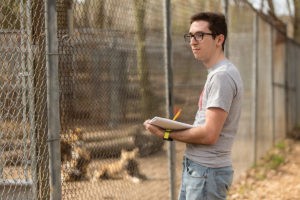 “It’s important for people to know wolves are not going to come into your backyard and attack you; they’re not going to hunt you down and eat your grandma,” Deterding said. “They would rather stay in their habitats where they are safe. One of the things the EWC does so well is to educate the public about how to coexist with wolves and teach people about how important they are to the ecosystem.”
“It’s important for people to know wolves are not going to come into your backyard and attack you; they’re not going to hunt you down and eat your grandma,” Deterding said. “They would rather stay in their habitats where they are safe. One of the things the EWC does so well is to educate the public about how to coexist with wolves and teach people about how important they are to the ecosystem.”
Prior to the internship at EWC, Deterding’s focus was on plant life. Then she watched a documentary about Yellowstone National Park and how the park rangers reintroduced wolves and restored the habitat to its natural form. “Because wolves no longer existed in Yellowstone, the herbivore population ate all the vegetation along the river banks. This caused erosion, and the ecosystem started to collapse,” she said. “Reintroducing wolves made a big impact by controlling the way the herbivores moved around. They’re not staying in one place for too long, and the ecosystem can find balance. Plants and animals are all tied together.”
Glass is also motivated by this concept. “The African painted dog is endangered right now, and the world in general is experiencing a mass extinction,” he said. “It’s easy to think that these ecosystems have no effect on us, but we’re living within them. Trying to get predators back to keep herbivores and ecosystems in check is incredibly important and key to making a better planet where people can continue to live. Being able to do even a little work toward reintroducing wolves into the wild has been a really rewarding experience for me.”
Caring for the environment is a much larger picture than saving a wolf. And while not everyone can help with wolf conservation, even small efforts, like recycling, help. “I’m more aware of how I’m impacting things,” Deterding said. “I’m telling everyone to learn about this and why it’s so important. I feel like family and friends are tired of hearing me talk about what I did at the center, but it’s really exciting for me. I’ve convinced two people to watch documentaries about painted dogs.”
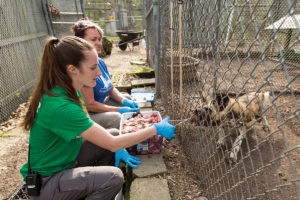 The EWC is fortunate to have quality interns like the Maryville students. It takes a tremendous amount of work to take care of all the animals and keep the center running smoothly. It also takes a huge effort from the larger community to support national wolf conservation efforts. The staff is in constant contact with experts in the field, researchers, veterinarians and zoos across the country. “It’s not just a matter of having some animals who are safe,” Glass said. “It’s an enormous amount of effort, communication and teamwork to keep them alive and healthy.”
The EWC is fortunate to have quality interns like the Maryville students. It takes a tremendous amount of work to take care of all the animals and keep the center running smoothly. It also takes a huge effort from the larger community to support national wolf conservation efforts. The staff is in constant contact with experts in the field, researchers, veterinarians and zoos across the country. “It’s not just a matter of having some animals who are safe,” Glass said. “It’s an enormous amount of effort, communication and teamwork to keep them alive and healthy.”
Deterding agreed with the importance of these skills, which she learned through her Maryville coursework, including research she conducted in Krakos’s pollination biology lab. “Learning how to work with a team and by myself, and asking questions when I wasn’t sure what to do are great examples of skills that helped me be successful in this internship,” she said.
Many animal-related internships focus on the interns completing menial tasks such as cleaning enclosures and picking up scat. It’s rare to be able to get hands-on experience with the animals. However, the EWC offers interns an opportunity to work directly with the animals while building their resumes.
“One of the best things about the internship program is all of the different things that the interns get to do,” Connett said. “They do some grunt work, but they also get to be a part of the research, observations, feeding, diet prep, breeding and learn about the wolves and conservation efforts. I’m really proud of the internship program and how it helps the interns gain skills and confidence.”


